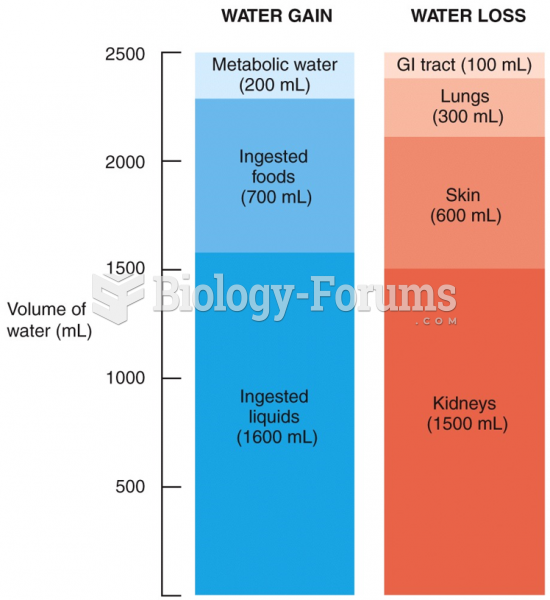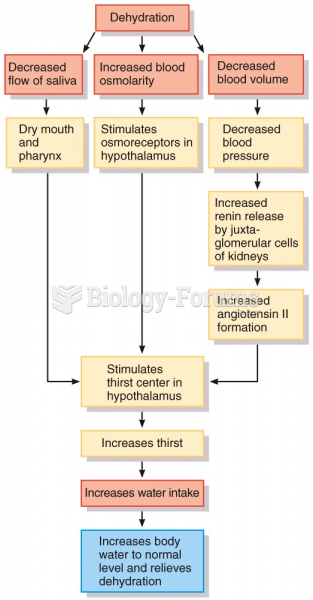Answer to Question 1
Vomiting can be a symptom of many different diseases or may arise in situations that upset the body's equilibrium, such as air or sea travel. For whatever reason, the contents of the stomach are propelled up through the esophagus to the mouth and expelled. Sometimes the muscular contractions will extend beyond the stomach and carry the contents of the duodenum, with its green bile, into the stomach and then up the esophagus. Although certainly unpleasant and wearying for the nauseated person, vomiting is often not a cause for alarm. Vomiting is one of the body's adaptive mechanisms to rid itself of something irritating. The best advice is to rest and drink small amounts of liquids as tolerated until the nausea subsides.
A physician's care may be needed, however, if vomiting causes such large losses of fluid as to threaten dehydration. As fluid is lost from the GI tract, the body's other fluids redistribute themselves, taking fluid from every cell of the body. Fluid leaving the cells is accompanied by salts that are absolutely essential to the life of the cells. Replacing salts and fluid is difficult if the vomiting continues, and intravenous feedings of saline and glucose may be necessary. Vomiting and dehydration are especially serious in an infant, and a physician should be contacted without delay.
Diarrhea is characterized by frequent, loose, watery stools. Such stools indicate that the intestinal contents have moved too quickly through the intestines for fluid absorption to take place or that water has been drawn from the cells lining the intestinal tract and added to the food residue. Like vomiting, diarrhea can lead to considerable fluid and salt losses, but the composition of the fluids is different. Stomach fluids lost in vomiting are highly acidic, whereas intestinal fluids lost in diarrhea are nearly neutral. When fluid losses require medical attention, correct replacement is crucial.
Diarrhea is a symptom of various medical conditions and treatments. It may occur abruptly in a healthy person as a result of infections (such as foodborne illness) or as a side effect of medications. When used in large quantities, food ingredients such as the sugar alternative sorbitol and the fat alternative olestra may also cause diarrhea in some people. If a food is responsible, then that food must be omitted from the diet, at least temporarily. If medication is responsible, a different medicine, when possible, or a different form (injectable versus oral, for example) may alleviate the problem. Diarrhea may also occur as a result of disorders of the GI tract, such as irritable bowel syndrome or colitis.
Answer to Question 2
Sometimes a sip of a beverage or a tiny bit of food slips down the wrong pipe. The body's first response is to cough, and quite often coughing clears the passage. When someone is truly choking, however, food has slipped into the trachea and completely blocked the air passageways. Thus the person cannot cough or even breathe. Without oxygen, the person may suffer permanent brain damage within 5 minutes or may even die. For this reason, it is imperative that everyone learn to recognize the universal distress signal for choking (hands wrapped around the throat) and act promptly.
Because the larynx is in the trachea and makes sounds only when air is pushed across it, a person choking will be unable to speak. For this reason, to help a person who is choking, first ask Can you speak? If the person is coughing, breathing adequately, or able to speak, do not interfere. Whatever you do, do not hit him on the back as the particle may become lodged more firmly in his air passageway. If the person cannot speak or cough, shout for help and perform the Heimlich maneuver. Almost any food can cause choking, although some are cited more often than others: chunks of meat, hot dogs, nuts, whole grapes, raw carrots, marshmallows, hard or sticky candies, gum, popcorn, and peanut butter. These foods are particularly difficult for young children (especially those 4 years of age and younger) to safely chew and swallow. Each year more than 10,000 children (14 years old or younger) in the United States choke; more than half choke on food. Every 5 days, a child in the United States chokes to death on food. An adult should be present and alert to the dangers of choking whenever young children are eating. To prevent choking, cut food into small pieces, chew thoroughly before swallowing, don't talk or laugh with food in your mouth, and don't eat when breathing hard.







